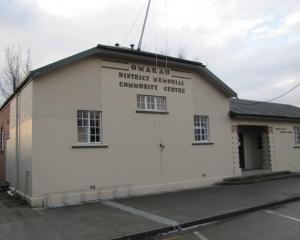
One man drove almost 100,000km over four years to visit his wife in a city dementia unit, another is still coming to terms with leaving his home of the past 40 years.
Both say the lack of retirement, rest-home and dementia facilities in Alexandra and Clyde is breaking up families and causing undue stress to those already vulnerable and coping with what old age brings.
"There's just not enough here for people to move to," Clyde resident Jim Barrie said.
"We don't really want to be leaving to go somewhere else, but feel we've got no other option."
Mr Barrie and his wife Geraldine have finally, after resisting doing so for years, bought a unit at Cromwell's Golden View Retirement Village. They are planning on moving there next year, while they are still healthy enough to cope with the shift and enjoy the retirement village atmosphere.
But it will mean leaving their home of four decades, their much-loved garden, and the ability to walk their grandchild to school in Clyde and pick her up at the end of the day.
They are trying to feel positive about their next era, but feeling more sad than anything, and still want progress on an Alexandra retirement village proposal that seems to have gone nowhere after five years.
"They've got to get cracking or they will keep losing people from the district," Mrs Barrie said.
Their comments are echoed by health and social service leaders who say the shortage of aged-care facilities in Alexandra and the wider Central Otago district is breaking up families and causing them undue stress.
Hospital level and secure dementia level beds throughout Central Otago and the Queenstown Lakes district were "generally full" and it was "difficult to place patients locally", Southern District Health Board health of older people portfolio manager Sharon Adler and Central Otago Health Services Ltd (Dunstan Hospital) chief executive Dr Kathryn de Luc said in a joint statement.
They said any retirement village should include rest-home, hospital-care and dementia beds, and were keen to talk to any potential providers looking to enter that market, as well as other existing providers. They also continued to "actively" discuss the "long-term health requirements for our fast-growing and ageing population" with the Southern District Health Board.

He and other trustees are frustrated by delays in land negotiations with the Crown over a 16ha block they would like for the development, and earlier this year announced a change of tack to instead start building on just an adjacent 4ha owned by the Central Otago District Council, while they continue negotiations for the rest of the land.

He hoped both the Vincent Community Board (which will soon consider a proposal from Leaning Rock to gift the council land or enter a joint venture for the retirement village) and council would realise how desperate the need was for such a facility and how many people were leaving Alexandra because of a lack of facilities.
"People come and buy a house here because this is where they want to retire, but then they have to move away again 10-15 years later because there is nowhere for them to go here when they get older and need more care. These people don't want to leave, but they have to. We're facing a grey tsunami over the next five years of baby boomers and the biggest worry is there's nowhere for them to go."
Mr Hishon believes the not-for-profit nature of the proposed Alexandra development is significant. Outside commercial providers have made it clear they are "not interested" in Alexandra and he believes the council and community board should be supporting the proposal. He wants people to lobby their Vincent board members to vote to do that.

He said he could not comment on the upcoming Leaning Rock application until it had been made, nor pre-empt any board decision.
However, he said the board had supported Leaning Rock in the past "and I'm confident it will be very supportive of Leaning Rock in the future".
Alzheimers Otago manager Elizabeth Harburg said Central Otago's ageing population would "undoubtedly" see an accompanying increase in dementia. The organisation regularly saw families having to leave the region because of a lack of services there.
Age Concern Central Otago co-ordinator Marie Roxburgh said "things are a bit sad for our ageing population in Central Otago".
"I have just this week seen one of our clients being sent to an available bed in Invercargill for rest-home care, which has a huge impact on not only the family but the community. His wife does not drive and they live very rurally so she is now very much alone. This all came about because of a fall, which can happen to anyone, but the thought then of having to go out of the region for either respite or permanent care causes so much stress."
Mrs Roxburgh said Age Concern was also seeing "carer burnout".
She said the Central Otago council should support the Alexandra retirement village, and had a "social responsibility to support the wellbeing of our older adults".
Ms Harburg also thought the council had a role "in helping the stress that many carers are facing", but other stakeholders also needed to come together.
"This is a community issue and it requires a community solution," Mrs Harburg said.

For the last four years he has driven almost 100,000km on weekly visits to see his wife Jeanette, who has been in a secure dementia unit in Dunedin because of her advanced Alzheimer's.
Mrs Cook has recently been moved back to Ranui, in Alexandra, partly because her condition has been "downgraded" because she no longer poses a risk to herself or others, because she can no longer move or feed herself.
Every day Mr Cook visits his wife and feeds her her lunch.
Every day he returns home and thanks small mercies - that his wife is finally back in the same town as him.
He knows of multiple families affected by dementia and the lack of aged-care facilities in Alexandra.
A retired chartered accountant - his wife was a respected school teacher - he remains active as an honorary Alexandra Rotarian, and spent years volunteering for the St John health shuttle.
But he no longer attends gatherings of an Alzheimer's support group.
He said he stopped going out of respect for others in the group, as he could sense they found it difficult facing the reality of what was going happen to their loved one.
What’s available
- Alexandra: Presbyterian Support Otago’s 48-bed Ranui Court Retirement Village, comprises 10-bed dementia unit and 38 beds for rest-home or hospital-level care. Waiting list for all areas.
- Roxburgh: Teviot Rest Home, caters for 14 residents, five-room expansion planned, has a waiting list.
- Ranfurly: Maniototo Hospital, 29 hospital and rest-home beds. Waiting list for rest-home.
- Cromwell: Ripponburn Hospital and Home, 15 rest-home beds, 25 hospital beds, 4 additional beds for rest-home or hospital; Ripponburn Lifestyle Village, 16 units.
- Cromwell: Golden View Retirement Village. Ninety-four two and three-bedroom villas, most already constructed, the rest to be finished by March 2020. Aged-care facility on-site also under construction, comprising 48 hospital beds, a 12-room dementia ward and a palliative care suite; and 19 assisted care apartments also being built.
- Elsewhere in Otago, there are another 13 care homes which offer secure dementia care: Aspiring Enliven, in Wanaka, seven in Dunedin, one in Milton, one in Balclutha and three in Oamaru. One of those Dunedin homes, and two others in Dunedin, offer psychogeriatric aged residential care, which was previously known as "D6", for the most advanced stage of dementia.
What’s proposed
- Leaning Rock Village not-for-profit retirement complex on an area alongside State Highway 8, in Alexandra.
- Would include mix of houses and units, rest-home and dementia unit.
- Proposed for 20ha of land, 4ha of which is Central Otago District Council land and the remainder Crown land for which Leaning Rock is in negotiations.












